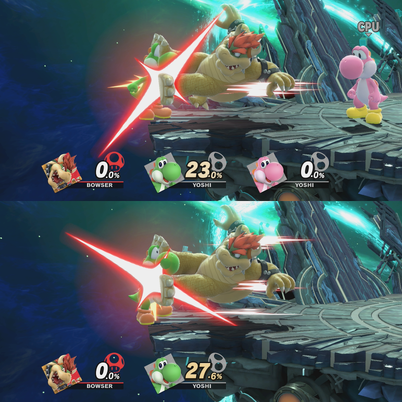1v1 multiplier: Difference between revisions
(more accurate) |
(I hope someone thanks me for this.) |
||
| Line 1: | Line 1: | ||
{{ArticleIcons|ssbu=y|unofficial=y}} | {{ArticleIcons|ssbu=y|unofficial=y}} | ||
[[File:1v1_Damage_Comparison.png|thumb|402px|In the first picture, {{SSBU|Bowser}}'s [[forward smash]] deals normal damage to {{SSBU|Yoshi}}. In the second picture, notice how the attack deals slightly more damage (check the damage counter on the right).]] | |||
The '''1v1 multiplier''', officially known as '''1-on-1 damage''', is a mechanic in ''[[Super Smash Bros. Ultimate]]''. First revealed by [[Masahiro Sakurai]] at [[E3 2018]], its purpose is to speed up matches between two players. When a match is started with only two players, and [[item]]s are off, characters take 1.2× [[damage]] from all sources. | The '''1v1 multiplier''', officially known as '''1-on-1 damage''', is a mechanic in ''[[Super Smash Bros. Ultimate]]''. First revealed by [[Masahiro Sakurai]] at [[E3 2018]], its purpose is to speed up matches between two players. When a match is started with only two players, and [[item]]s are off, characters take 1.2× [[damage]] from all sources. | ||
Revision as of 02:25, August 21, 2019

The 1v1 multiplier, officially known as 1-on-1 damage, is a mechanic in Super Smash Bros. Ultimate. First revealed by Masahiro Sakurai at E3 2018, its purpose is to speed up matches between two players. When a match is started with only two players, and items are off, characters take 1.2× damage from all sources.
Unlike most other damage multipliers, the 1v1 multiplier modifies damage taken, rather than damage given, and is applied after all other calculations. For example, a move with a damage output of 10% first inflicts said amount of damage, and then once all byproducts are determined (such as the amount of knockback), an extra 2% is added by the multiplier, for a total of 12% damage. As a result, it has some unintuitive interactions:
- It does not affect the amount of damage needed to KO an opponent. If a move will KO when it hits an opponent at 120%, it will do so whether the 1v1 multiplier is on or off.
- It does mean that the opponent will be at higher damage before the last hit of a multi-hit move connects, and thus the move will effectively KO earlier.
- Similarly, while the damage necessary to break armour is unaffected, the higher damage dealt by previous hits may alter whether the next hit will succeed. K. Rool's belly is an exception, as the mechanic must first apply the final post-multiplier damage in order to split the applied damage between K. Rool and his belly, and only then can it decide whether to break.[1]
- It does not affect the length of hitstun, freeze frames, shieldstun, status effects (such as bury or sleep), and so on.
- It does not cause projectiles to break through reflection earlier.
- It does not affect the damage received by counterattacks or absorption moves.
- It amplifies recoil damage and hoop damage, but it does not alter healing.
Shields and stage elements are unaffected by the multiplier, though most other player-created objects are (such as Pikmin).
If a match is started with more than two players and items turned off, the 1v1 multiplier does not take place even after there are only two remaining players. However, in training mode, it actively toggles on and off depending on how many CPU opponents are selected to appear (taking effect during any period there is only one CPU), and spawning items does not affect its presence. This also makes training the only mode where damage from non-character items can be altered by the 1v1 multiplier.